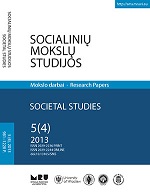Transcendavimo judesys Europoje ir naujoji mąstymo paradigma
The Movement of Transcending in Europe and New Reasoning Paradigm
Author(s): Povilas AleksandravičiusSubject(s): Social Sciences
Published by: Mykolas Romeris University
Keywords: movement of transcending; reasoning paradigm; Christianity; rationality; intuition; Europe
Summary/Abstract: This article defines the process of transcending and reveals its role in the European context from Ancient Greece to the present day. In all of the spheres of human existence – philosophy, culture, science and religion included – this process manifested itself as a drive for criticism and creativity, forming the very essence of being European. The fundamental role played by Christianity in consolidation of transcendence was also revealed: the notion of a human being as a person arose from Jewish-Christian theology that regards human being, the image of God as an essentially relative substance and that is why it is always forced to transcend the hitherto boundaries to be oneself. However, the transcendence can operate in different ways as well as result in different reasoning paradigms. Until the present day, the rational reasoning paradigm was dominant in Europe. Rationality means “breaking away” (Jan Patočka) from mythological reasoning and hence consolidation of reliance on logic, one’s own autonomy, criticism and creativity in one’s relation to reality. However, rationality can easily turn into “rationalisation” (Edgar Morin) of reality, i.e. its enclosure in a certain conceptual system or ideology. It is claimed that this particular unauthentic and dangerous version of rationality was dominant until the present day, as evidenced by the triumph of globalised technology that also brought deadly problems for itself in the fields of ethics, politics and ecology. The old, purely rational reasoning paradigm has exhausted itself. Today, a new type of paradigm becomes imminent, meaning a new perception of intellectuality, as well as new configuration of rationality and intuition. This is a change of the way transcendence works: instead of accepting reality in human consciousness according to dichotomy principles of subject/object, it is perceived as if from within itself, intus legere, where discursive cognition stays essential but subordinate process. This new paradigm of reasoning reveals itself in the texts of philosophers, such as Henri Bergson and Martin Heidegger, and brings out a particular resonance with some branches of the Eastern philosophy.
Journal: Socialinių mokslų studijos
- Issue Year: 5/2013
- Issue No: 4
- Page Range: 1009-1028
- Page Count: 20
- Language: Lithuanian

